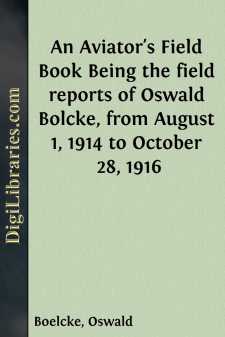Categories
- Antiques & Collectibles 13
- Architecture 36
- Art 48
- Bibles 22
- Biography & Autobiography 813
- Body, Mind & Spirit 142
- Business & Economics 28
- Children's Books 16
- Children's Fiction 13
- Computers 4
- Cooking 94
- Crafts & Hobbies 4
- Drama 346
- Education 46
- Family & Relationships 57
- Fiction 11829
- Games 19
- Gardening 17
- Health & Fitness 34
- History 1377
- House & Home 1
- Humor 147
- Juvenile Fiction 1873
- Juvenile Nonfiction 202
- Language Arts & Disciplines 88
- Law 16
- Literary Collections 686
- Literary Criticism 179
- Mathematics 13
- Medical 41
- Music 40
- Nature 179
- Non-Classifiable 1768
- Performing Arts 7
- Periodicals 1453
- Philosophy 64
- Photography 2
- Poetry 896
- Political Science 203
- Psychology 42
- Reference 154
- Religion 513
- Science 126
- Self-Help 84
- Social Science 81
- Sports & Recreation 34
- Study Aids 3
- Technology & Engineering 59
- Transportation 23
- Travel 463
- True Crime 29
An Aviator's Field Book Being the field reports of Oswald Bolcke, from August 1, 1914 to October 28, 1916
by: Oswald Boelcke
Description:
Excerpt
An unassuming book, still one of those which grip the reader from beginning to end. When the author started to write his daily impressions and adventures, it was to keep in touch with his people, to quiet those who feared for his safety every moment, and at the same time to give them a clear idea of his life. Without boasting, modestly and naturally, he describes the adventures of an aviator in the great World War. It could well serve as a guide to those who are studying aviation. Although he has avoided the stilted tone of the school-master, still his accomplishments as a knight of the air must fascinate any who know aviation. For the aviators as well as their machines have accomplished wonders. They are rightly called the eyes of the army—these iron-nerved boys who know no fear. Admiral Schley’s historic words after the battle of Santiago: “There will be honor enough for us all” can well be said of the aviators of all nations now at war. For in spite of all enmity the aviators have followed the knightly code of old which respects a good opponent and honors him. Captain Bölcke’s death, after his meteoric career, was mourned alike by friend and foe. Great as is the damage done by this war, horrible as is its devastation, it has acted as a tonic on aviation. Before the war, of course, there had been some achievements of note. Since the day when the Wright brothers announced their conquest of the air, man did not rest till the problem was completely solved. And this war, which continually has spurred man to new murderous inventions, has also seen the airplane in action. While at the start of the war the comparatively few airplanes in use were employed as scouts, a few months saw them fitted with machine guns and devices for dropping explosives. Hand in hand with this came the rapid development of the airplane itself. To-day we can truthfully say that a journey, even a long one, by airplane is less dangerous than an automobile ride through a densely populated district. But one thing we must not forget, even though the invention of the airplane by the Wrights is an American one (in spite of the fact that the Wrights give some credit to the German Lilienthal) the Europeans have far outstripped us in the development of this invention. As sad as it is to say it, we must admit that in regard to aviation America is still in its infancy. Every European nation has outdone us. When, in the summer of 1916, we sent our troops to Mexico, they had only six old machines at their disposal. Instead of relying on these for information, General Pershing had nothing but anxiety for their safety every time they made a flight. But here, too, if all signs are not deceiving, war has helped us to awake. Aside from the activity in our training-schools where thousands of our young men, surpassed by none anywhere, are being trained, the building of our airplanes is taking a great step forward. The experience gained on the other side is helping us here. At first it was the automobile factory that furnished the satisfactory motor. But now through the war the airplane factories have made enormous progress and helped the aviator to attain new marks in speed, reliability and endurance. While this war lasts every improvement in the airplane is utilized to make added destruction. Yet we can not doubt that after the war we will see further progress made in the airplane in the peaceful contests which are to follow.
INTRODUCTION
By Prof. Hermann Bölcke, Dessau
Oswald Bölcke was born on the 19th of May, 1891, in Giebichenstein, a suburb of Halle on the Saale. Here his father was professor in the high school. His sister, Luise, and his two brothers, Wilhelm and Heinrich, were born before him in Buenos Ayres, Argentina. There his father had had his first position—rector of the German Lutheran School. Later, Oswald’s brother Martin was born in Halle and his brother Max in Dessau. Oswald was the first child born to the Bölcke’s in Germany. On the 17th of July, the wedding-day anniversary of his parents, he was baptized by his uncle, the Rev. Edmund Hartung. This occurred during a vacation spent at his grandmother’s, at Freyburg-on-the-Unstrut, in the same church in which his mother had been baptized, confirmed and married, by the same minister. After a year the family moved to Halle, where he could romp joyously on the Viktoria-platz with his two older brothers and his sister.
At the age of four and a half years he moved to Dessau, in 1895, where his father had received a position as professor in the Antoinette School, connected with a teachers’ seminary. He had another year and a half of joyous play in this city. Then he was sent to school, and he owed his education to the Friedrichs gymnasium at Dessau, from which he graduated in the Easter of 1911. When he was three years old he had had a severe attack of whooping-cough. This had left a strong tendency to asthma, and was the cause of much trouble at school through illness. In fact, it was a weakness that plagued him with continual colds even to the last few weeks of his life. While still only a youth, he fought this weakness by practising long-distance running, and in 1913 he won second prize in the Army Marathon at Frankfurt. Aside from this, he was perfectly healthy and was always exercising to keep himself so. In his boyhood he learned how to swim while resting on the hands of his father, who was holding him in the waters of the Mulde River. In a few moments, to the amazement of the spectators, he was paddling around in the water like a duck. This is an example of his courage and self-confidence. In the same way he rapidly developed into a skilled, fearless mountain climber under the tuition of his father, when, as a seventeen-year-old boy, he was first taken on such trips. In the Tux district trips were taken from Lauersbach, and the more difficult the climb the more it pleased Oswald. Only when there was real danger was there any joy for him. His mother will never forget the time she witnessed his climbing of the Höllenstein. She was on the lower Krieralpe watching. When it was time to descend he, taking huge strides, fairly ran down the slope covered with loose slabs of stone and waited, standing on his head, for his more cautious father and his brother Martin.
His principal, Dr. Wiehmann, said in the words he spoke at Oswald’s burial: “He had no mind for books or things studious; in him there burned the desire for action....









